|
|
|
Sort Order |
|
|
|
Items / Page
|
|
|
|
|
|
|
| Srl | Item |
| 1 |
ID:
171086
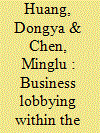

|
|
|
|
|
| Summary/Abstract |
Most existing scholarship regards private businesspeople in China as allies of the party-state, without considering how the private sector’s policy influence is possible in an authoritarian state where the political elites dominate the policy-making process. Based on the large number of successful proposals that the All-China Federation of Industry and Commerce (ACFIC) has submitted to the Chinese People’s Political Consultative Conference, this study reveals the rising policy influence of private businesspeople in the past decade. It finds that their influence on government policy is not realized simply through collusion or informal ties with local governments at the stage of policy implementation. Instead, they now can voice their interests and exert influence as a group in national policy making at the central level through formal institutional channels. In recent years the influence of business associations affiliated with the ACFIC has been increasing, mainly due to institutional changes at the national level that encompass their input. This entails political co-optation that helps empower the private sector to exert influence on policy, rendering it unnecessary for the business community to challenge the political system from the bottom up.
|
|
|
|
|
|
|
|
|
|
|
|
|
|
|
|
| 2 |
ID:
171080
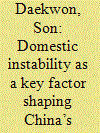

|
|
|
|
|
| Summary/Abstract |
This study explores the domestic determinants of China’s intervention in the Korean War. Since the war, scholars have produced a large number of studies on the motivations behind China’s intervention in the war. These previous studies paid scant attention to domestic aspects, all of them assuming, albeit implicitly, that Party leaders could readily harness all available domestic resources and devote them to their political ends and that the public was willing to sacrifice their material resources and lives in order to satisfy the leaders’ political goals. By contrast, this study, based on extensive newly unearthed archival documents, argues that very unfavorable domestic circumstances helped shape the CCP’s strategy both before and after the outbreak of the Korean War. The domestic challenges not only provided the rationale for the CCP’s opposition to Kim Il-Sung’s Korean War plan before June 1950 but also gave an internal impetus for China’s vacillation in decision making and affected Mao’s final proactive decision to enter the war in October 1950.
|
|
|
|
|
|
|
|
|
|
|
|
|
|
|
|
| 3 |
ID:
171087
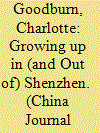

|
|
|
|
|
| Summary/Abstract |
Extensive research has shown that rural-to-urban migrant children in China face significant barriers to an urban public primary school education and often end up in poor-quality, migrant-run private schools. However, much less is known about what happens after children leave junior high school. This article therefore draws on two rounds of interviews with migrant children educated in Shenzhen, in 2008–9 and then in 2015–16, to examine in detail their experiences of schooling and labor-market entry. It identifies four distinct pathways of education—state vocational school, private migrant secondary school, state academic high school, and return to the countryside for further schooling—and suggests that these educational routes all ultimately lead to the same endpoint: regardless of pathway, aptitude, financial investment in education, and earlier career aspirations, migrant youths are channeled into low-skilled urban service work. This is in marked contrast to the hopes of parents that their children will achieve upward mobility through investment in education. This article analyzes the multiple reasons for the depressing uniformity of outcomes and the crucial role of state policy at both the central and local levels in perpetuating migrant disadvantage.
|
|
|
|
|
|
|
|
|
|
|
|
|
|
|
|
| 4 |
ID:
171084
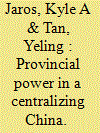

|
|
|
|
|
| Summary/Abstract |
In a Xi Jinping era of rising central power and policy activism, what role is left for Chinese provinces? This article argues that, notwithstanding centralizing tendencies, China’s recent economic development trajectory cannot be understood without taking into account the distinctive policy roles and priorities of provincial governments. Successive waves of governance restructuring have in many ways strengthened rather than weakened provincial authorities, reinforcing their role as central-local gatekeepers within China’s political economy. In particular, we draw attention to the ways that provinces create and shape “development space” (fazhan kongjian 发展空间) for different industries and localities and alter the contours of China’s international economic engagement. We explore how provinces use their position as brokers of development space to concentrate investment in privileged areas of the economy while neglecting other aspects of development, deviating from central priorities in the process. Using case studies about industrial policy, rural development, and foreign economic relations, we show how—even in an era of centralism—provinces’ developmental drive remains untamed.
|
|
|
|
|
|
|
|
|
|
|
|
|
|
|
|
| 5 |
ID:
171082


|
|
|
|
|
| Summary/Abstract |
The Belt and Road Initiative (BRI) has been widely criticized as a purely strategic project to enhance China’s international influence. Focusing on an ongoing yet underresearched signature BRI project, the China-Europe freight train routes, this article challenges such a sweeping characterization, which has masked the complexities of the reality. The freight initiative arose from local-level actors in multiple sites as a cost-effective means to make use of preexisting rail tracks across Asia to enhance transport efficiency. Their efforts later metamorphosed into what today looks like a grand unified project, politicized by the national government and subsidized by competing provincial capitals. The article provides an explanation for the complex consequences of the freight train project’s politicization.
|
|
|
|
|
|
|
|
|
|
|
|
|
|
|
|
| 6 |
ID:
171079
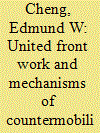

|
|
|
|
|
| Summary/Abstract |
This article examines the Hong Kong regime’s mechanisms of countermobilization as a reaction to and preemptive strike against dissent. It reveals how united front work historically rooted in Chinese Communist Party apparatuses has penetrated into Hong Kong. The PRC’s Liaison Office in Hong Kong and the Hong Kong government have established a hierarchical yet dispersed platform to combine repression with outsourced contention. Hong Kong’s regime demonstrates its resilience in how it and the Liaison Office’s united front apparatus recruit nonstate actors to constrain opposition from below through both carrots and sticks. More broadly, the article unpacks how the regime’s mechanisms of patronage, counterprotest, attrition, and stigmatization operate. While these regime repertoires have curtailed organized resistance during some periods, they have also eroded the regime’s legitimacy, exposing it to the re-eruption of protests. The article concludes by assessing how the pro-government united front alliance was utilized during the unprecedented summer of dissent in 2019 over a proposed extradition law.
|
|
|
|
|
|
|
|
|
|
|
|
|
|
|
|
|
|
|
|
|